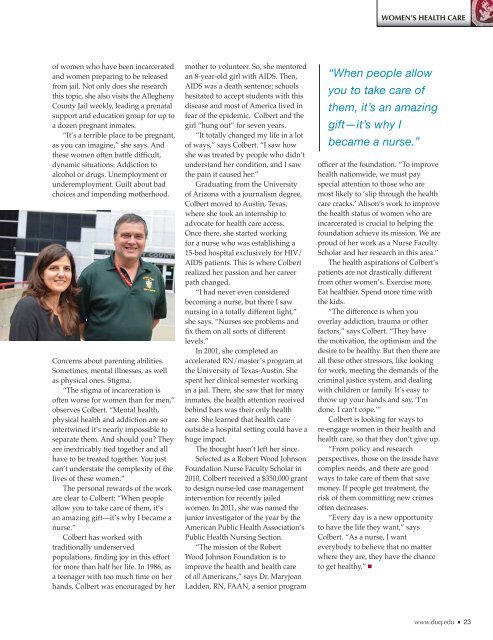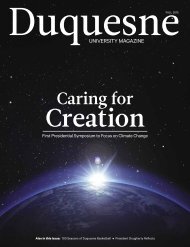2014-Winter-DU-Magazine
2014-Winter-DU-Magazine
2014-Winter-DU-Magazine
You also want an ePaper? Increase the reach of your titles
YUMPU automatically turns print PDFs into web optimized ePapers that Google loves.
WOMEN’S HEALTH CARE<br />
of women who have been incarcerated<br />
and women preparing to be released<br />
from jail. Not only does she research<br />
this topic, she also visits the Allegheny<br />
County Jail weekly, leading a prenatal<br />
support and education group for up to<br />
a dozen pregnant inmates.<br />
“It’s a terrible place to be pregnant,<br />
as you can imagine,” she says. And<br />
these women often battle difficult,<br />
dynamic situations: Addiction to<br />
alcohol or drugs. Unemployment or<br />
underemployment. Guilt about bad<br />
choices and impending motherhood.<br />
Concerns about parenting abilities.<br />
Sometimes, mental illnesses, as well<br />
as physical ones. Stigma.<br />
“The stigma of incarceration is<br />
often worse for women than for men,”<br />
observes Colbert. “Mental health,<br />
physical health and addiction are so<br />
intertwined it’s nearly impossible to<br />
separate them. And should you? They<br />
are inextricably tied together and all<br />
have to be treated together. You just<br />
can’t understate the complexity of the<br />
lives of these women.”<br />
The personal rewards of the work<br />
are clear to Colbert: “When people<br />
allow you to take care of them, it’s<br />
an amazing gift—it’s why I became a<br />
nurse.”<br />
Colbert has worked with<br />
traditionally underserved<br />
populations, finding joy in this effort<br />
for more than half her life. In 1986, as<br />
a teenager with too much time on her<br />
hands, Colbert was encouraged by her<br />
mother to volunteer. So, she mentored<br />
an 8-year-old girl with AIDS. Then,<br />
AIDS was a death sentence; schools<br />
hesitated to accept students with this<br />
disease and most of America lived in<br />
fear of the epidemic. Colbert and the<br />
girl “hung out” for seven years.<br />
“It totally changed my life in a lot<br />
of ways,” says Colbert. “I saw how<br />
she was treated by people who didn’t<br />
understand her condition, and I saw<br />
the pain it caused her.”<br />
Graduating from the University<br />
of Arizona with a journalism degree,<br />
Colbert moved to Austin, Texas,<br />
where she took an internship to<br />
advocate for health care access.<br />
Once there, she started working<br />
for a nurse who was establishing a<br />
15-bed hospital exclusively for HIV/<br />
AIDS patients. This is where Colbert<br />
realized her passion and her career<br />
path changed.<br />
“I had never even considered<br />
becoming a nurse, but there I saw<br />
nursing in a totally different light,”<br />
she says. “Nurses see problems and<br />
fix them on all sorts of different<br />
levels.”<br />
In 2001, she completed an<br />
accelerated RN/master’s program at<br />
the University of Texas-Austin. She<br />
spent her clinical semester working<br />
in a jail. There, she saw that for many<br />
inmates, the health attention received<br />
behind bars was their only health<br />
care. She learned that health care<br />
outside a hospital setting could have a<br />
huge impact.<br />
The thought hasn’t left her since.<br />
Selected as a Robert Wood Johnson<br />
Foundation Nurse Faculty Scholar in<br />
2010, Colbert received a $350,000 grant<br />
to design nurse-led case management<br />
intervention for recently jailed<br />
women. In 2011, she was named the<br />
junior investigator of the year by the<br />
American Public Health Association’s<br />
Public Health Nursing Section.<br />
“The mission of the Robert<br />
Wood Johnson Foundation is to<br />
improve the health and health care<br />
of all Americans,” says Dr. Maryjoan<br />
Ladden, RN, FAAN, a senior program<br />
“When people allow<br />
you to take care of<br />
them, it’s an amazing<br />
gift—it’s why I<br />
became a nurse.”<br />
officer at the foundation. “To improve<br />
health nationwide, we must pay<br />
special attention to those who are<br />
most likely to ‘slip through the health<br />
care cracks.’ Alison’s work to improve<br />
the health status of women who are<br />
incarcerated is crucial to helping the<br />
foundation achieve its mission. We are<br />
proud of her work as a Nurse Faculty<br />
Scholar and her research in this area.”<br />
The health aspirations of Colbert’s<br />
patients are not drastically different<br />
from other women’s. Exercise more.<br />
Eat healthier. Spend more time with<br />
the kids.<br />
“The difference is when you<br />
overlay addiction, trauma or other<br />
factors,” says Colbert. “They have<br />
the motivation, the optimism and the<br />
desire to be healthy. But then there are<br />
all these other stressors, like looking<br />
for work, meeting the demands of the<br />
criminal justice system, and dealing<br />
with children or family. It’s easy to<br />
throw up your hands and say, ‘I’m<br />
done. I can’t cope.’”<br />
Colbert is looking for ways to<br />
re-engage women in their health and<br />
health care, so that they don’t give up.<br />
“From policy and research<br />
perspectives, those on the inside have<br />
complex needs, and there are good<br />
ways to take care of them that save<br />
money. If people get treatment, the<br />
risk of them committing new crimes<br />
often decreases.<br />
“Every day is a new opportunity<br />
to have the life they want,” says<br />
Colbert. “As a nurse, I want<br />
everybody to believe that no matter<br />
where they are, they have the chance<br />
to get healthy.”<br />
www.duq.edu 23




